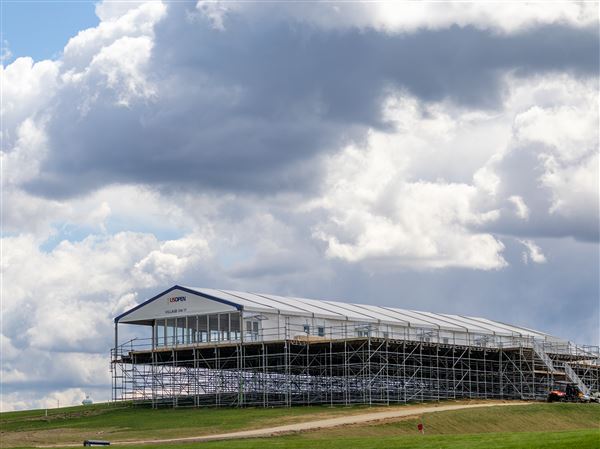The deep freeze that broke records in hundreds of cities across the eastern half of the United States on Friday will last most of next week.
Another widespread round of ice, snow or freezing rain is set to start falling today from Missouri to the mid-Atlantic and as far south as Alabama and Georgia.
“Higher amounts over the next two days will probably be across southern Indiana and Illinois and eastward through Ohio into Western Pennsylvania,” said National Weather Service senior meteorologist Bruce Sullivan. “That’s where it looks like the jackpot will be.”
But even before the latest snowstorm, residents had to deal with school cancellations, power outages, road hazards and water main breaks from the punishing cold. Here’s a look at the latest weather and the effect it is having around the nation:
“Polar vortex” is so last year. Forecasters are calling the record-setting bout of icy air the “Siberian Express” because winds coming from Russia are traveling over the Arctic Circle and pushing into Canada and the United States.
“We can almost show the trajectory from Siberia all the way to the U.S.,” Mr. Sullivan said, noting that meteorologists began using the term long ago.
Despite being the buzzword of winter 2014, polar vortex also has been used for decades in meteorology. It is a pocket of very cold air that typically swirls around the North Pole. “Sometimes little pieces break off,” Mr. Sullivan said. That has also happened this week, meaning a frosty one-two punch.
For the second consecutive winter, bitter weather threatens to turn the surface of the Great Lakes into a vast, frozen plain. Nearly 81 percent of the lakes’ surface area was covered with ice, the NOAA Great Lakes Environmental Research Laboratory reported Friday. That was down slightly from more than 85 percent the previous day — a glitch that probably happened because strong winds broke apart some ice and created open spots detected by satellites, said George Leshkevich, a physical scientist with the lab in Ann Arbor, Mich.
But with forecasts calling for frigid weather at least through the end of the month, the ice cover may keep expanding, he said. It’s grown rapidly as temperatures have plunged this month, nearly doubling over the past couple of weeks.
Bitter cold temperatures have shattered decades-old records from Cincinnati to Washington to New York.
In Western Pennsylvania, temperatures dipped to minus 18 in New Castle, minus 15 in Butler and 6 below zero in Pittsburgh — all records.
The National Weather Service said the low Friday got down to 6 degrees at Reagan National Airport, just across the Potomac River from Washington. At Baltimore’s airport, the temperature dipped to a record low 2 degrees. Records also were set in Cincinnati (12 degrees below zero), at Newark Liberty International Airport in New Jersey (1 degree); Trenton, N.J. (zero degrees); and in New York’s Central Park (2 degrees.
The deep freeze transformed Niagara Falls into an icy spectacle, encasing the trees around it into crystal shells and drawing tourists who are braving below-zero temperatures. The Niagara River is flowing below the ice cover, so the falls aren’t completely frozen. But days of subzero temperatures have created a thick coating of ice and snow on every surface near the falls, including railings, trees and boulders.
In Massachusetts, a Boston-bound commuter ferry carrying more than 100 passengers had trouble steering in the ice and had to be towed to port. After the ferry went off course, the ice breaker towed it to Boston, arriving about 45 minutes later than normal. No one was hurt and the boat was not damaged.
Elsewhere in the Northeast, ferries on New York’s East River also were canceled.. And the Cape May-Lewes Ferry, which connects Delaware and New Jersey, halted operations because of ice and wind.
The Virginia National Guard flew in food, medicine and mail to an ice-bound fishing and tourism outpost in the middle of Chesapeake Bay, 14 miles from the mainland. Tangier Island Mayor James “Ooker” Eskridge played down its plight, but said medicines were essential for those who could not get off the island. Tangier has no drugstore. “But you know, we’re not starving out here,” he said. “This happens when you live in the middle of the Chesapeake Bay.”
In Alabama, dozens of school systems dismissed students early or canceled classes altogether. NASA shut down its Marshall Space Flight Center at the U.S. Army's Redstone Arsenal in Huntsville, Ala., because of deteriorating road conditions.
A storm began unloading ice, sleet and snow, and the weather service said roads were impassable in at least seven counties. Huntsville and the rest of the state’s northeastern corner is under a winter storm warning through early today, and forecasters say much of northern Alabama and Georgia could get snow and sleet, including metro Atlanta.
First Published: February 21, 2015, 5:00 a.m.
















